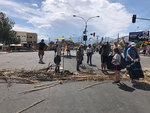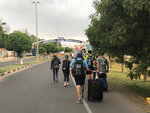


Pastor Tracy Durham of the Vader Assembly of God got caught up in the political unrest in Bolivia while on a trip sponsored by the Northwest Ministry Network of the Assembly of God earlier this fall.
“It was chaos. Luckily we had 4-wheel drive because we were driving through city parks, over sidewalks and curbs,” he told The Chronicle recently.
Eight other ministers accompanied Durham on the missions trip to meet with partners their association is supporting in Bolivia to see the progress they are making on behalf of the Assembly of God, which was established in Bolivia in 1956.
The group left on Thursday, Oct. 17 and flew into Santa Cruz and from there to Cochabamba, which is where the nine of them met their missionary hosts.
Election Day on Sunday, Oct. 21, in Bolivia is a national holiday as well as a pedestrian holiday, meaning there are not any vehicles on the roads from about 8 a.m. to 6 p.m.
“They actually serve (the voters) a little bit of food, a loaf of bread and maybe, a bowl of soup or something. It’s a social event — bring your kids down, your family,” said Durham.
Durham said that since they were without transportation on Sunday, they all watched the Seahawks game.
On Monday, Oct. 22, the ministers flew into the capital city of La Paz to visit churches and meet with national leaders to discuss how to better support the churches around Bolivia.
“Our meeting was interrupted by our van driver, who said there’s a protest coming and we need to leave now or we’re going to get caught in the middle of a protest,” said Durham.
The population of La Paz is 2.7 million people and Durham and the other ministers were in the center of town.
“Here comes a whole group of peaceful protesters, beating drums, waving flags and the other way comes the police with their water cannons and riot gear,” he said. Durham said they were able to dodge the commotion and get out of La Paz.
They flew from the La Paz airport to Cochabamba which, as they were told in the airport, had become the center of the election protests.
“The president Evo Morales, a socialist president, declared victory over his opponent and it was all very suspicious and people knew it was,” said Durham.
When they landed in Cochabamba they were able to make it back to their hotel in taxis that took them through the back alleys and side streets to avoid the crowds of protesters.
The taxi drivers warned Durham and the others that the next day was the big protest day and since their hotel was right downtown they left at 4:30 a.m. and made it to their missionary host’s home and spent their day there.
“The following day things had began to heat up. People began to set up these barricades,” he said.
The barricades were low piles of wood, debris, ropes, chucks of cement, piles of dirt built to block off city streets.
“Can you imagine that in Seattle? Every block or two, nobody could get around,” said Durham.
They left the host home that night in order to get some dinner and noticed a blockage of semi trucks.
“About 20 to 30 semi trucks parked in the middle of the road,” he said.
They drove up a one-way street in order to get around the semi trucks but came to several barricades that they couldn’t get around. Durham said people were banging pots and pans, waving flags and beating drums.
“About that time the convoy of semi trucks moved forward and completely blocked us in,” recalled Durham.
A couple guys with Durham’s group got out of the car and started clearing a barricade so the car could make it through. A group of protesters came running up and started yelling and taking photos of their license plate. Durham said it was very tense and he was he was worried it was going to get physical. They ended up making it through that barricade but came to another one soon after.
“Our hosts got out and said (in Spanish) ‘please we have women, there’s Americans and we just want to go home. Can you please let us through?’” said Durham. They made it back to the missionary host’s home which was gated and secure.
The next morning they realized that the only way for them to make it to the airport to fly home was to walk through the streets. It was 7.5 miles.
Durham said they all wished they would’ve packed lighter.
“We didn’t know what to expect. We didn’t know if people were going to be aggressive toward us or if we wouldn’t be able to make it at all,” explained Durham.
The group of ministers prayed before they left for God to lead them through.
It was about noon when they left. The missionary hosts, who spoke Spanish, walked with them to the airport. There was a total of 13 people including Durham trying to get to the airport. “Here’s all 13 of us gringos with our suitcases and backpacks,” said Durham.
At the first barricade the protesters apologized to the group. “They were very kind about it. (The protests) are the only way their voice can be heard. It’s for their nation.” said Durham.
As they continued to walk through they expressed that they were on the protester’s side and believed in their cause. They started saying “Viva Bolivia” and waving small Bolivian flags to show their support. They were let through the barricades and the protesters started clapping.
“Once they found out we were on their side they were clapping, some people helped us with our suitcases, they were taking our picture, offering us water, cheering us on,” said Durham.
While they were in Bolivia the U.S. embassy in La Paz, Bolivia issued a security alert to warn travelers of the “reports of large demonstrations and sporadic violence.”
Fortunately Durham and his group did not experience any violence, but that is not the fate of many people living in Bolivia during this volatile time.
After four and a half hours of walking with their suitcases, they made it to the airport at about 4 p.m. but their flight didn’t leave until 7 a.m. the next morning. “The floors were covered with people trying to get out of the country. All the flights were full,” expalined Durham.
Durham made it home on Oct. 27.
“I learned that basically — human nature, we are the same everywhere you go. (The Bolivians) love their families, their freedom to live their life in a meaningful way and we saw that in Bolivia just as we would (in the U.S.). (Bolivians) want their freedoms, they didn’t want four more years of socialism. They want democracy and that’s what they stood up for — some of them to the point of laying down their lives,” said Durham.